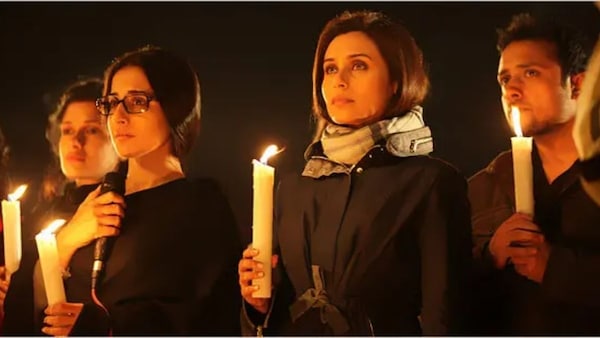Revisiting No One Killed Jessica: Rani Mukerji, Vidya Balan’s thriller captured the pathos of justice denied
No One Killed Jessica, directed by Raj Kumar Gupta, completes 11 years of release this week.

Last Updated: 09.25 PM, Jan 03, 2022
Filmmaker Raj Kumar Gupta directorial debut, Aamir, starring Rajeev Khandelwal, was a compelling portrait of rampant Islamophobia in the country set against a backdrop of a fictional terror attack on a Mumbai bus. Gupta displayed incredible restraint by creating a jaw-dropping thriller that hardly has any dramatic action sequences playing out on screen. Naturally, when No One Killed Jessica, also written and directed by Gupta, released, there was a lot of anticipation surrounding it.
The film stars Vidya Balan and Rani Mukerji, the royalties of Indian cinema, in a fictional depiction of possibly one of the most high-profile criminal cases in modern India. Thus, the outcome of the said case is widely known to the news reading audience. But to Raj Kumar Gupta’s credit, the tension never gets diluted.
Oscillating between fact and fiction, No One Killed Jessica retells the story of Jessica Lall’s murder. In 1999, the model was shot dead at an elite nightclub in Delhi by Manu Sharma, the son of a minister, for refusing him a drink. Despite the murder taking place in front of dozens of witnesses, the accused was acquitted. After widespread public outcry over his acquittal, the case was reopened and the accused was sentenced to life imprisonment.
The first half of the movie is squarely focused on retelling the events that led up to and followed Jessica’s death. In an interview, Sabrina had praised Gupta for his acute sense of detail in how he represented the story on screen. “Rajkumar Gupta has replicated almost every detail of the events of the proceedings after Jessica’s death. Even the dialogues and conversations in the film are what I’ve gone through,” she was quoted as saying.
In No One Killed Jessica, Gupta captures the mounting frustration and pathos of a sister denied justice. Vidya Balan plays Sabrina, Lal’s younger sister, who forges ahead with steely resolution against a system that is designed to fail her. Young and full of hope, Sabrina starts out with a burning desire to put the man who nonchalantly killed her sister in a drunken stupor. But when the witnesses, as many as 80 people, turn hostile, her conviction starts to crumble. Balan portrayed Sabrina with incredible sensitivity, bringing to fore her character’s rage and grief.
Gupta’s other protagonist Meera, essayed by Rani Mukerji, is a brazen foil to Sabrina’s restraint. She is a volatile TV news presenter, jaded by the constant demand of her job, and the woman who bands together with Sabrina to put the culprit Manish (Mohammad Zeeshan Ayyub), whose name is changed in the film, behind bars. Unlike the Bollywoodised perspective towards journalism, which often presents journalists as trouble-makers (seen as recently as in Mumbai Diaries 26/11), here the journalist becomes a propeller of positive change.
She is also the dramatic core of No One Killed Jessica, planting herself atop car bonnets to convince her editor to pursue a story, or hurling abuses towards prying co-passengers. Her characterisation gives the film the dynamism that it needed to draw audiences to the theatres. Further, it also bolsters conversations around the power of media to mobilise the masses to action. Curiously, it is Rang De Basanti that inspires people to march forward in the candlelight vigil, another film about mobilising masses against systemic injustice.
No One Killed Jessica teeters dangerously close to being a docudrama in the first half, a style of filmmaking not a lot of Hindi mainstream movies had incorporated till then. To negotiate the space with its fictional catalyst Meera, Amit Trivedi’s pulsating music and the chaos of Delhi.
Nonetheless, the disparate tones of the film seem to perpetually be at loggerheads. Sabrina’s sedateness is so realistic that the Bollywoodisation of the other arcs in the film may tend to appear broad-stroked over a decade after the film’s release. A lot of it has to do with how viewers’ tastes have evolved in recent years, with constant exposure to world content. However, No One Killed Jessica brought two of the Bollywood bigwigs under the same roof to narrate a tale that is still fresh in public memory. And just for that brave attempt, the film deserves to be rewatched.
Watch No One Killed Jessica here

